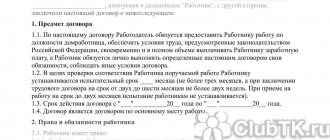With the help of a prenuptial agreement, spouses have the opportunity to indicate how property will be divided in the event of a divorce and distribute areas of financial responsibility among themselves. Such a document allows you to protect the interests of the husband and wife, and therefore for many couples it is the only option for maintaining a good relationship.
However, the agreement has a number of nuances; its preparation and drafting requires certain knowledge, including Russian legislation. Therefore, it is better to entrust such work to a lawyer. The specialist will draw up a legally competent document that meets all legal requirements.
Reasons for signing a marriage contract
The reasons that prompt the bride and groom or married spouses to go to a notary and legally draw up a marriage contract are described in detail in the table.
| Causes | A comment |
| Protection of property from unfavorable division | Marriages are sometimes concluded between persons who are at different levels of the social ladder and, accordingly, have different incomes and property assets of different values. In this regard, one of the reasons for drawing up a marital contract is the desire of the spouse who earns or owns significantly more assets than the other spouse to protect them. |
| Purchasing real estate in the future | In legal practice, there are cases when, for example, a man became a shareholder and invested a large sum of money in the construction of an apartment building. However, before this house is completed, he plans to get married. Consequently, he will register ownership of the apartment only after the wedding, which means that it will be joint and will be divided in half during a divorce, although he only invested his own money in it. To prevent such a development of events, lawyers usually advise drawing up a marriage agreement before the wedding and indicating that the apartment in the high-rise building under construction is the personal property of the husband. |
| Doing business | To ensure that the non-businessman spouse does not pass on the large business debts of the second spouse in the event of bankruptcy or business troubles, an acceptable solution would be to enter into a prenuptial agreement. The same is true for a business spouse who wants to protect his assets from his other half. |
| Desire to formalize a regime of separate property and separate expenses | This mode is very convenient for spouses who intend to avoid any disagreements during the dissolution of their marital relationship. The agreement will clearly indicate that the property goes to the spouse who bought it or in whose name the state registration was carried out. In addition, the separate property regime automatically implies the division of debts. |
Main points of a marriage contract
Drawing up a marriage contract is allowed only between a woman and a man who are planning to get married or who are already legal spouses for each other. The contract can only contain obligations and rights related to the property sphere of marital relations during marriage or during divorce. The property governed by the agreement must already be at the disposal of the parties to the contract at the time of its signing, or the spouses must plan to purchase it in the future.
The law does not provide for a strictly fixed structure for a marriage contract, however, lawyers and attorneys have established during their practice that the contract usually contains several elements described in the table.
| Elements of the contract | A comment |
| Top part | This part of the contract must indicate:
|
| Main part | In this section, the parties or the lawyers they hire specify the terms under which the marriage contract will be written. The totality of these conditions may be different, since the parties have the right to freedom of contract and can regulate in it any relations that by law relate to the subject of the marriage contract. For a marriage contract this is:
|
| Procedure for termination or modification | In this section, spouses can indicate:
|
| Signatures of the contract participants | Signatures must be put in one's own hand. Representatives cannot sign for spouses or future newlyweds. |
The Family Code prohibits including the following provisions in the text of a marriage agreement:
- Infringement of the capacity or legal capacity of one of the parties, for example, denial of the right to earn a living independently, choose a city of residence or type of leisure.
- Restriction of the right to seek protection in courts.
- Settlement of non-property relations, for example, any issues relating to the intimate sphere, number of children, choice of surname or vacation spots.
- Child support.
- Restriction of a disabled marriage partner on receiving monetary or other support
- Any rules that classify the situation of one of the parties as extremely unfavorable, for example, the denial of the right to receive any of the joint property assets in a divorce.
Cost of notarization
The price for certification of an agreement drawn up by spouses independently is 500 rubles. notary fee and cost of technical and legal services. The price for these services varies depending on the subject of Russia in which the spouses live. As a rule, in the regions, notaries charge approximately 5,000 - 7,000 rubles for certifying a marriage agreement, and in capital cities (Moscow, St. Petersburg) the price tag can rise to 10,000 rubles.
The concept of “technical and legal services” means:
A notary checks the text of the contract for compliance with legal requirements.- Checking the passport details of the parties and their legal capacity.
- Familiarization with property documents and studying information about property assets specified in the text of the contract.
- Clarification to the parties of unclear terms in the text of the contract.
- A warning about possible consequences that may occur when executing a marriage agreement.
- Placing a certification inscription.
If the parties wish to use the help of a lawyer or notary in drawing up a marriage contract, then they need to be prepared to incur additional costs. In this case, it is difficult to say about specific prices that can be announced by lawyers, but it is absolutely clear that they depend on the following factors:
- Urgency.
- Workload.
- Complexity of the contract.
In addition, the parties to the contract can use additional paid services of law firms, for example, assessing property assets, preparing and checking documentation. Parameters that can also affect the increase in price are the prestige of the company or the excellent business reputation of the lawyer. In this regard, the price range for the work of lawyers and lawyers in drawing up a contract in the regions ranges from approximately 3,000 to 20,000 rubles, and in the capitals - from 5,000 to 50,000 rubles.
Expenses for representative services
If one of the parties to the donation cannot be present during the transaction, you can use the services of a representative. Representatives can be citizens with full legal capacity and legal entities. It is better to use the services of a professional lawyer.
Costs associated with hiring a representative:
- execution of a power of attorney for a representative. In the power of attorney for making a gift, the representative must name the donee and indicate the subject of the gift. Otherwise, the power of attorney is void.
- cost of representation services. The cost of these services is not regulated by law, but is set by the representative himself or determined by agreement of the parties.
- the cost of notarization of the power of attorney, if it is necessary to notarize the transaction.
Powers of attorney on behalf of minors and incapacitated citizens are issued by their legal representatives.
The procedure for terminating and amending a marriage contract
Change
It is carried out only on the basis of mutual consent of the parties and only in a notary’s office. The law allows changes to be made to the contract at any time while it is in force.
In order to change the terms of the marriage contract, you need to draw up a separate document and describe the changes in it. Once notarized, this document will become an integral part of the marriage contract.
Before going to an appointment with a notary, spouses are required to prepare the following documents:
- Passports.
- Two original copies of the marriage agreement.
- Three copies of the agreement to amend the marriage contract.
- Property documents if spouses want to settle obligations and rights regarding new property assets that were not originally specified in the marriage contract.
The procedure for amending a contract at a notary is similar to the procedure for certifying a marriage agreement. As for the price, it averages 3000-5000 rubles.
In exceptional cases, the law allows one of the parties to demand changes to the contract without obtaining the consent of the other party. This is possible when:
- The second partner violated the terms specified in the contract. As a result, the injured partner is no longer able to receive the benefit that he expected at the time of entering into the prenuptial agreement.
- Circumstances have changed significantly, and the parties could not have foreseen this change when entering into the contract.
- The second partner intentionally placed the other party to the contract at a disadvantage by depriving him of all or most of his rights to the joint property.
Civil law prohibits spouses from immediately going to court if they want to change the terms of the contract. First, the interested partner must invite the other partner to change the terms of the contract on a voluntary basis.
To do this, you must draw up a written document indicating:
- Personal data of the person proposing the changes and personal data of the addressee.
- List of proposed changes.
- Grounds that allow the writer of the letter to insist on the annulment of certain provisions of the contract.
- The maximum period given for reflection (usually no more than 30 days).
There are two legal ways to transfer an offer to another partner:
- Give in person or through a representative. This is done as follows: you need to take 2 copies of the proposal with you. One copy is given to the spouse, on the second copy the spouse writes that he received a copy of the proposal to change the marriage contract and puts his signature.
- Send via registered mail with notification.
If the proposal is ignored, or the answer to it is a categorical refusal, in the future nothing will restrain the interested spouse from submitting the dispute to the court.
Cases on changing the marriage contract are handled by the magistrate if:
- There are no property claims in the claim.
- Property claims do not exceed the amount of 50,000 rubles.
Other claims are dealt with by district courts.
As for the place of legal proceedings, the documents must be submitted to the judicial authority located at the place of residence or stay of the defendant, or to the court specified in the agreement on jurisdiction between the defendant and the plaintiff.
The state duty is 300 rubles if the claim does not include property claims. If the plaintiff has claims on property, then the procedure for calculating the duty can be found here.
Along with the statement of claim, the interested party provides:
- A copy of the marriage contract.
- An offer to amend a contract with a signature from the other party or return receipt requested.
- Any evidence showing that the other party has breached the contract, or circumstances have changed significantly, or one of the parties is disadvantaged by the terms of the contract.
- Document confirming payment of the duty.
The judge's task is to check, on the basis of the evidence provided by the parties, whether there are indeed legitimate reasons to change the provisions of the contract or whether there are none. To confirm a fundamental breach of contract, it is sufficient to prove that the plaintiff suffered damages or the fact that he was deprived of the opportunity to receive what was due to him under the contract. This damage must be attributable to the defendant's culpable acts.
If circumstances have changed significantly, the plaintiff must simultaneously prove to the judge the following:
- When drawing up the contract, the marriage partners could not predict that the situation would change significantly.
- The change in the situation makes it unprofitable for the plaintiff to maintain the previous contract.
- The execution of the previous contract will cause damage to the plaintiff, namely property damage.
- The partners did not stipulate in the contract that the plaintiff was responsible for the risk if the life situation changed significantly.
The unfavorable position of one of the parties is determined based on the analysis of the text of the agreement, in which:
- One of the parties loses all property during a divorce or receives no more than 5-10% of joint assets.
- One of the parties to the contract gave all the personal property that she had before the marriage to the other party or most of her property.
If the judge is convinced by the plaintiff’s evidence, and this evidence does not contradict the law, then the claim will be satisfied. Otherwise, the plaintiff's claims are rejected by the court.
Termination
It occurs in the same order as changing the contract, i.e.:
- If partners or former marriage partners have reached an agreement that the marriage contract should be dissolved, the transaction must be formalized by a notary.
- If agreement cannot be reached, then the requirements of the interested party in writing are submitted to the court.
Who pays tax when donating property?
A deed of gift creates a legal relationship, as a result of which the donee is enriched at the expense of the donor. Since the transaction is gratuitous, the recipient receives income in the amount of the value of the gift.
According to the provisions of Articles 208 and 228 of the Tax Code of the Russian Federation, the donee, when receiving property as a gift, is obliged to submit a tax return no later than April 30 and pay personal income tax no later than July 15 of the year following the year the gift was received.
The tax rate is established by clause 1 of Article 224 of the Tax Code of the Russian Federation and is:
- 13% of the market value of the property received as a gift, if the donee is a tax resident of the Russian Federation;
- 30% of the market value of the donated property will have to be paid to the non-resident.
In cases where a gift is made between close relatives, the donee is exempt from paying personal income tax (Clause 18.1, Article 217 of the Tax Code of the Russian Federation).
Real estate objects received as a gift, in addition to personal income tax, will be subject to property tax for individuals (Article 401 of the Tax Code of the Russian Federation). This tax is paid once a year, the amount is calculated based on the cadastral value of the object (Article 403 of the Tax Code of the Russian Federation) and will range from 0.1 to 2 percent.
Division of property under a marriage contract
| The prenuptial agreement contains information about the division of marital assets | The prenuptial agreement contains no information about the division of marital assets. |
| The distribution of property assets between marital partners is based on these rules. |
|
Arbitrage practice
The case described below was heard in the Beloyarsk City Court of the Sverdlovsk Region in November 2021.
According to the plot of the case, the ex-wife demanded from the court:
- Cancel paragraph 3 of the marriage contract and declare it invalid. The basis for invalidity, according to the plaintiff, is that the law does not allow, under a marriage contract, to transfer the personal belongings of one spouse, purchased by him before marriage, into shared ownership or into the property of the other spouse.
- To collect from the ex-husband half the amount paid on bank loans during the marriage, as well as interest for late payments, since he did not fulfill the obligation provided for in paragraph 4 of the contract.
The ex-husband, in his response to the claim, indicated that the spouses have the right to change the personal property regime to a different property regime. With regard to the demand for payment of money, the plaintiff exceeded the time established by law for filing a claim.
The judge decided the case as follows:
- The conditions described in paragraph 3 of the agreement comply with the law, namely Article 42 of the Family Code, which allows, in a marriage contract, to change the regime of property belonging to one of the marriage partners. Thus, the plaintiff's claims in this part were rejected.
- The court assessed whether the plaintiff was disadvantaged. Considering the fact that in total after the divorce she received property worth more than 7 million rubles, the position of the ex-wife cannot be considered unfavorable.
- The defendant does not have evidence that he paid his ex-wife half of the amount transferred to banking organizations to repay loans during the marriage, therefore, he did not fulfill the obligation assigned to him. Thus, in this part, the ex-wife’s claim is satisfied.
Lawyer's answers to citizens' questions
I live in a big house alone. No family, no children. There is a small apartment in which no one lives. I want to give it to my younger sister (on my father’s side). Is she required to pay income tax?
Regardless of which parent is common, children are considered relatives. In your case, you are half-related (having the same father). According to clause 18.1 of Article 217 of the Tax Code of the Russian Federation, the donee is exempt from paying personal income tax if the donor is his close relative. Your sister will be exempt from paying personal income tax.
How to give an apartment to your wife?
If you purchased an apartment before marriage, it is your personal property and you have the right to dispose of it at your own discretion. Draw up a gift agreement and register the transfer of rights in Rosreestr. If you purchased an apartment during marriage, it is jointly acquired property. First, allocate shares and then give your share to your wife.
I gave the apartment to my daughter. The daughter has already received documents - an extract from the Unified State Register of Real Estate. Now the son insists on including him in the deed of gift. How to do it?
Since your daughter received a certificate of ownership, she is the sole owner of the property donated to her and only she can dispose of it at her own discretion. If the donation is formalized in accordance with all the requirements of the current legislation, then there are no grounds either for canceling the gift agreement or for declaring it invalid. Now only your daughter can give part of the apartment to her brother.
Regulatory framework
| Legislation | List of articles |
| Tax Code (Part 2) | Article 333.19 – it fixes the amount of court fees for various categories of claims. Article 333.24 - it reflects the amount of state fees paid by citizens in favor of notaries. |
| Family code | Article 41 regulates the nuances of concluding marriage contracts. Article 42 establishes the categories of legal relations that may and may not be included in the subject of the marriage agreement. Article 43 describes the grounds that allow the parties to modify or terminate the marriage agreement. |
Requirements for donors and recipients
When making a gift, the parties act as equal subjects. The parties to the donation can be individuals, legal entities, municipalities, foundations. Individuals must be capable and have legal capacity.
If a donation is made in favor of minor citizens under 14 years of age, their interests are represented by parents, adoptive parents, and trustees.
If the donees are citizens aged 14 to 18 years, the completion of the gift agreement occurs with their participation and can only be carried out with the written consent of their parents, adoptive parents or trustees.
Legal relations that arise when concluding a deed of gift are regulated by civil law. The donee receives not only ownership of the donated object, but also some obligations.






